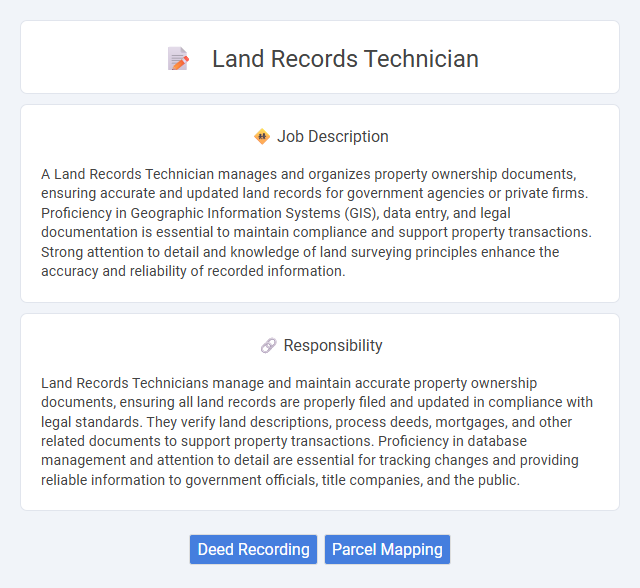
A Land Records Technician manages and organizes property ownership documents, ensuring accurate and updated land records for government agencies or private firms. Proficiency in Geographic Information Systems (GIS), data entry, and legal documentation is essential to maintain compliance and support property transactions. Strong attention to detail and knowledge of land surveying principles enhance the accuracy and reliability of recorded information.
Individuals with strong attention to detail and an interest in property documentation are likely to be well-suited for a Land Records Technician role. Those who prefer structured environments and possess good organizational skills may find this job rewarding. Candidates who struggle with meticulous data management or have low tolerance for repetitive tasks might find this position challenging.
Qualification
A Land Records Technician typically requires a high school diploma or equivalent, with many employers preferring an associate degree in geographic information systems (GIS), land surveying, or a related field. Proficiency in land records management software, GIS applications, and understanding of property laws and zoning regulations are essential qualifications. Experience with data entry, document verification, and strong attention to detail significantly enhance job performance in maintaining accurate land ownership and transaction records.
Responsibility
Land Records Technicians manage and maintain accurate property ownership documents, ensuring all land records are properly filed and updated in compliance with legal standards. They verify land descriptions, process deeds, mortgages, and other related documents to support property transactions. Proficiency in database management and attention to detail are essential for tracking changes and providing reliable information to government officials, title companies, and the public.
Benefit
A Land Records Technician role likely offers the benefit of gaining specialized knowledge in property documentation and public records management. Employees may experience stable employment opportunities due to the essential nature of land record maintenance in government and private sectors. The position might also provide access to professional development and certification programs, enhancing career advancement potential.
Challenge
A Land Records Technician may face challenges related to the accuracy and management of extensive property data, which requires meticulous attention to detail and the ability to navigate complex legal documents. There is a likelihood of encountering outdated or incomplete records that demand careful verification and updating to maintain data integrity. Handling such challenges effectively is crucial for supporting property transactions and maintaining public trust in land records systems.
Career Advancement
Land Records Technicians who develop expertise in geographic information systems (GIS) and property law position themselves for career advancement into Land Surveyor or Title Examiner roles. Gaining certifications such as Certified Mapping Scientist (CMS) enhances credibility and opens opportunities in government agencies and private sector firms specializing in real estate and urban planning. Strong analytical skills and proficiency with land management software contribute to upward mobility within municipal land offices and environmental consulting firms.
Key Terms
Deed Recording
A Land Records Technician specializing in deed recording manages the accurate entry and maintenance of property deeds in governmental databases to ensure legal compliance and property ownership clarity. This role involves verifying the authenticity of documents, updating land ownership records, and coordinating with title companies and public offices. Expertise in local real estate laws, meticulous data entry skills, and proficiency with land records management systems are essential for maintaining accurate and accessible property transaction records.
Parcel Mapping
Land Records Technicians specializing in parcel mapping accurately create, update, and maintain digital and physical maps reflecting property boundaries and ownership details. They utilize geographic information systems (GIS) and computer-aided drafting (CAD) software to ensure precise spatial data integration for land parcel identification and documentation. Their expertise supports land surveyors, government agencies, and real estate professionals by providing essential parcel mapping data for legal and planning purposes.
 kuljobs.com
kuljobs.com